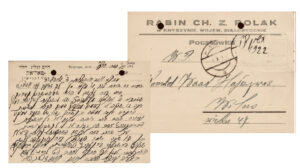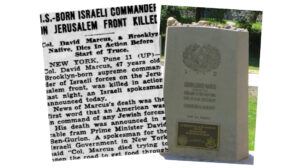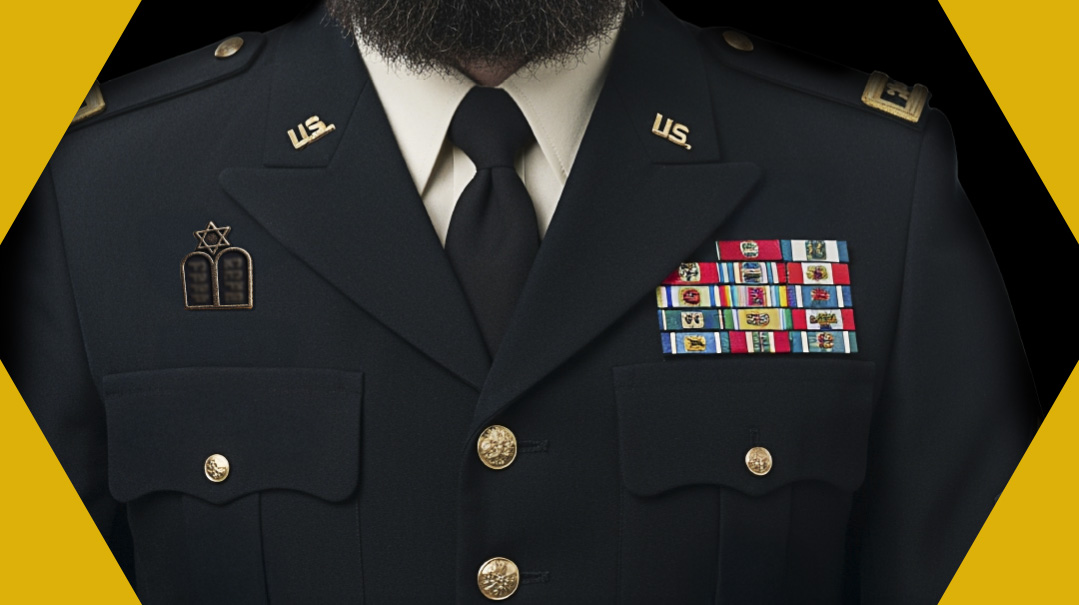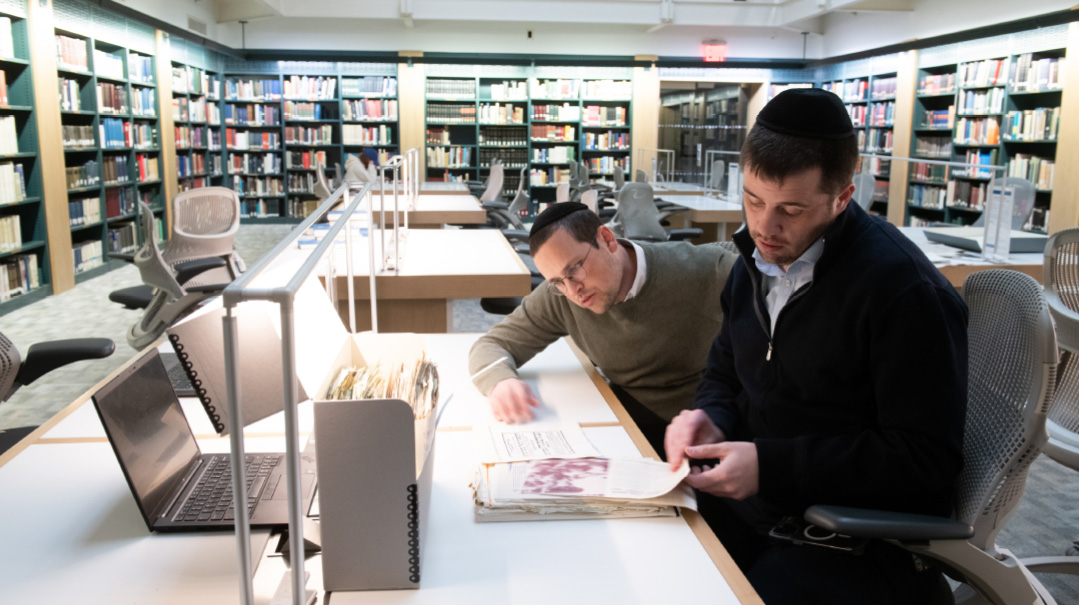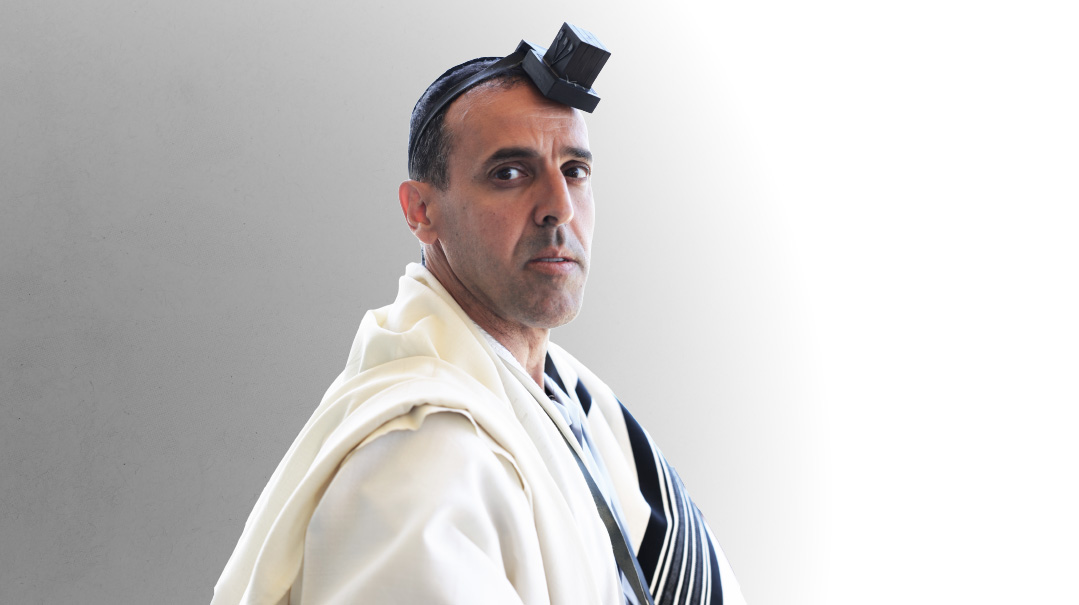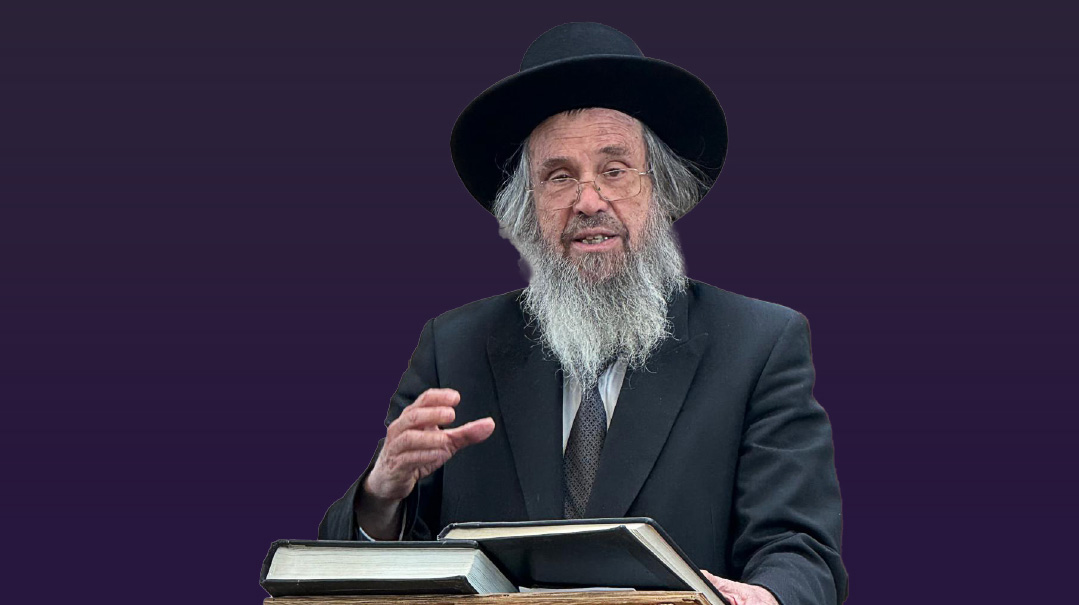Intersecting Lives of Yakob and Yom Tov

“I am a Jew, and it is forbidden for me to marry a Gentile. I thank you for your good intentions, but it is impossible for me to fulfill your request.”
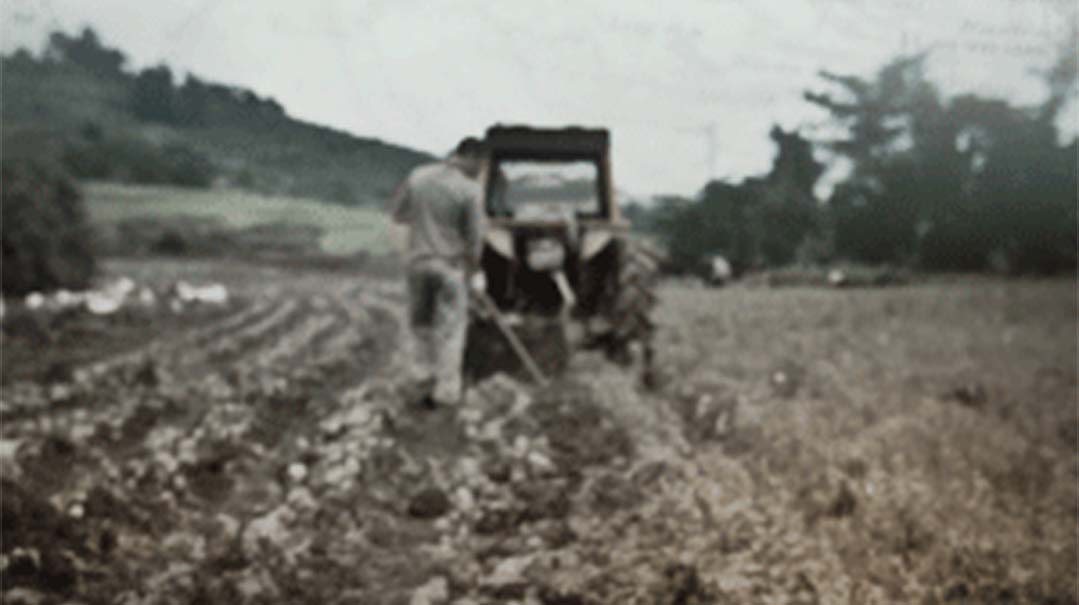
2012
An engagement in Jerusalem. The relatives of the young chassan and kallah from the Eisenstein and Rosenthal families were overjoyed at the shidduch but it was more than the simchah of knowing another Jewish home was to be built. The union between these two families was a closure of sorts the sweet end to a story that began over 70 years ago in war-ravaged eastern Russia.
The newest bride and groom were the great-grandchildren of Reb Yaakov Potash z”l — the real-life person who was canonized in the ever-popular song “Yakob” and Reb Yom Tov Ehrlich z”l the legendary composer who made him famous through the song that bears his name — sung at Potash’s own wedding 66 years ago.
1946
In a tiny hall on the outskirts of Paris a year after the war ended a group of refugees had gathered to celebrate the marriage of the young chassan Yaakov Potash and his kallah Yentel — who except for the chassan’s one surviving brother were the two lone remnants of their families murdered by the Nazis. Suddenly silence fell upon the hall as the chassan’s close friend a talented young composer by the name of Yom Tov Ehrlich related that he had met the chassan inSamarkand Uzbekistan and had written a song in his honor. Reb Yom Tov then began to sing relating Yaakov’s personal story:
“In the state of Uzbekistan between the Dijan mountains on the border of India and Afghanistan …”
The song describes the heroism of the chassan when the gentile town chieftain sought to take him — by force if necessary — as a son-in-law.
“Yakob rises and declares fervently ‘I am a Jew! I cannot do this. The Torah forbids me to marry a wife who does not believe in the holy Torah.…’
The song — “Yakob” — has been passed down for three generations and many of us grew up with it either in its original recording by Reb Yom Tov Ehrlich himself or in subsequent recordings in both Yiddish and Hebrew by veteran chassidic singer Avraham Fried.
With the help of Reb Yom Tov’s son Reb Moshe Ehrlich and the Potash family we’ve once again pieced together the gripping story of the intersecting lives of Reb Yom Tov and Reb Yaakov with the song “Yakob” at the nexus of their connection.
In The Middle Of Nowhere
Reb Yom Tov Ehrlich, a seventh-generation Karliner chassid and devout follower of the rebbes of Karlin-Stolin, was born in a village near the town of Stolin in 1914, while his father Reb Moshe had been conscripted to the Russian army. When Reb Moshe, a talented musician, finally returned (Yom Tov was already eight years old), he bought his son a fiddle. In the Russian army, the fiddle had saved Reb Moshe from the front, and indeed, two decades later, it was the vehicle for his son’s salvation.
During the Second World War, as the Germans advanced into Russia, a string of what could only be described as miracles led Reb Yom Tov and his family to eventually make their way to Samarkand in Uzbekistan, joining other Jewish refugees who fled to this primitive eastern city in order to escape from the Nazis. During those years, Reb Yom Tov became known as a healer of broken souls, and many Jewish refugees flocked to him as he composed Yiddish niggunim that encouraged them and were a balm to their broken spirits.
Meanwhile, hundreds of kilometers away, in a remote kolkhoz (collective village) in the hills of Tajikistan, another refugee named Yaakov Potash sat on a tractor and performed the grueling agricultural work the villagers assigned him.
Reb Yaakov was born into a family of Vorker chassidim in the town of Radzimin, about 20 kilometers from Warsaw. He was one of ten biological children to his parents, who also adopted another four orphans. When Yaakov was about 12 years old, his parents sent him away to learn in Baranovich, known for the famed Novardok yeshivah of Rav Elchonon Wasserman Hy”d. Baranovich was also the center of Slonimer Chassidus and the location of its yeshivah, Toras Chesed, which was under the auspices of the Rebbe Rav Shlomo David Yehoshua Weinberg Hy”d.
Yaakov learned for a short period in the Slonimer yeshivah before moving on to Stolin, where he attended the yeshivah headed by the Rebbe Reb Moshe Hy”d — son of the Yanuka of Stolin — and Reb Shlomo Slavin Hy”d.
In the summer of 1942, with the onslaught of the German army, the community began formulating an escape plan. Their first priority was to save the Stoliner Rebbe, but he rejected the idea and emphasized that if it had been decreed that the city be destroyed, he wanted to remain there with the kehillah until the end. At the same time, he urged his students and followers to flee for their lives.
On Erev Rosh Hashanah, the remaining members of the community, including the Rebbe and Rosh Yeshivah, were slaughtered by the Nazis.
Yaakov, who was then only 13, followed his Rebbe’s instructions and escaped to Vilna with a group of other students. There, he learned in the yeshivah of Rav Aharon Kotler ztz”l, which had been exiled from Kletzk — until the Nazi legions approached Vilna. Yaakov fled together with a group of bochurim, but was separated from them after crossing the Russian border. With no alternative, he continued alone into the unknown. It was Erev Shabbos. Above him was the open sky and all around him were forests, trees, and endless emptiness. Suddenly, he came across an old man with a long, snow white beard. “Where is the closest settled area?” young Yaakov asked.
Instead of responding, the old man took out a pen and a piece of paper and sketched a tiny map that would help Yaakov find his way through the endless spaces that lay ahead of him. Yaakov thanked the man warmly, but he just nodded and quickly disappeared. Yaakov, buoyed by the clear Divine Providence, continued deep into the Russian east, sometimes by foot, sometimes by wagon, always following the map, until he found himself in a tiny, isolated village. No roads and no railroad tracks led there. Some agricultural produce was grown locally, but a transport plane sent by the government — the only connection the village had with the outside world — brought additional food and supplies every so often. The pilot would deliver his wares to the village officials and then continue on his way to yet another remote village. The food would then be distributed to the bearers of vouchers, which the villagers received in exchange for the work they performed for the Motherland.
Long, Lonely Nights
“Somewhere in that field, far away in exile, an old tractor made its way between the paths. Sitting on the tractor was a grown boy; it seemed that he would be driving forever…”
Yaakov didn’t reveal his identity, but the villagers welcomed him and, despite his young age, they entrusted him with their prized possession — the tractor — which he handled with skill and proficiency. His output in two days was what other villagers managed in two weeks.
Like the other workers, Yaakov also received vouchers for food, but he used only those that provided him with the meager fruits, vegetables, and bread he felt he could bring to his mouth. He squirreled away the vouchers for meat, perhaps one day they would be useful.
Yaakov preferred to sleep out in the fields, despite the danger. To him, that was preferable to sleeping under the same roof as the Muslims of Uzbekistan. He kept a small can of kerosene and some matches beside him as he slept, and whenever he heard the sounds of a wild animal approaching, he would light a fire that would send the animal fleeing in panic.
Alone and isolated, the young man did his best to keep Shabbos, tracking the days of the week in a small notepad. It was no simple matter to abstain from work that entailed chillul Shabbos, but he endeavored to engage only in activities that would not transgress biblically-prohibited melachos.
On Friday nights, Yaakov had no wine for Kiddush. He sufficed with two slices of bread and a piece of fruit or a vegetable, whatever was available. Then he would lie down on his makeshift mattress on the ground, seeking to rest his weary, aching body. His heart burned with yearning for his parents, for his family, and for the yeshivah he had left behind.
“At night, the yearning overcame him; he yearned for his home, for his parents, for the home that may have been destroyed, for the yeshivah where he used to spend his time, for the learning day and night —‘Amar Rava, amar Rav Papa…’ and yet Abaye has a different perspective; he would resolve a new difficulty, bring a proof and everything would be resolved.…”
Sometimes, Yaakov would take a harmonica and sit before a blazing bonfire in the dark night, surrounded by Tajiks. On those occasions, the tiny instrument would produce mournful melodies; even the peasants could sense his spiritual longing.
“I Am a Jew!”
Yaakov’s efficiency, talent, and refined nature captured the hearts of the villagers. One evening, when Yaakov was setting out for the night in the fields, he turned around and noticed two young men following him. “The village chief wants to see you now!” they announced, and he obediently returned to the village.
“From all that I have heard about you, and all that I have seen with my own eyes, you have impressed me very much,” the Muslim sheikh began their conversation, placing his oversized hand on Yaakov’s gaunt shoulder. “I would like you to marry my daughter. She is a fine girl, with all the best qualities. In return, you will receive 30 cows, 20 oxen, dozens of suits and clothes, and a bundle of money that will last you for many years.” The man’s eyes sparkled, certain that Yaakov would pounce on the opportunity of a lifetime.
A chill ran up Yaakov’s spine. Once again, his parents’ home flashed before his eyes. His mother kneading challah dough for Shabbos, her fingers swollen from the effort. As a child, Yaakov had tried to understand why the act of kneading always came along with swollen fingers. She explained to him, “If we want our children to grow up to be talmidei chachamim, we have to work hard for it.”
The memories continued to overwhelm him. In his mind’s eye, he saw his mother lighting the Shabbos candles, covering her face with her hands and murmuring softly. Yaakov leaned over and heard her whispering, “Give us the merit to raise sons and grandsons … ”
“Yaakov sits with his gaze downcast, and he does not say a word. He looks back through the years, far into the distant past. He sees his mother lighting the candles, with a prayer on her lips. Please, O Creator, watch over Yankele, let him not lose the faith …”
In that moment, Yaakov decided that the time had come to reveal the truth. He stared deep into the eyes of the astonished village chief and announced definitively, “I am a Jew, and it is forbidden for me to marry a Gentile. I thank you for your good intentions, but it is impossible for me to fulfill your request.”
Despite Yaakov’s emphatic declaration, the chieftain had already decided to take Yaakov as his son-in-law, be it by his choice or by force. How could Yaakov betray him and ignore the kindness of the villagers, who had taken him in and had given him food and shelter? And so he declared, “Tomorrow night, we will celebrate your engagement. May it be a happy occasion for all of us!”
The news quickly spread throughout the village, and everyone was overjoyed by the tidings of the upcoming celebration. Meanwhile, Yaakov was in the throes of an emotional maelstrom. Would this be the end of the line as a Jew?
By evening, Yaakov knew that he had to run for his life. As he hurried to the storage room where he kept his belongings and began packing his tiny bundle, he noticed the bright lights blazing in the hall, already bedecked in wreaths of flowers, where the engagement party was to take place. He heard the orchestra playing, and his nostrils were accosted by the aroma from the barrels of wine that had been opened in honor of the occasion. His senses were assailed by the glamour. The yetzer hara was trying to entice him with its colorful bait. And then Yaakov suddenly remembered, once again, the scenes from the yeshivah of his youth.
“ ‘Amar Rava, amar Rav Papa’, he sees the letters as if in the Gemara. They speak in his voice, they cry out in shock, “What are you doing, Reb Yankel? Run away quickly!”
Yaakov shook himself alert. And then he discovered the meat vouchers that he had stashed away over time. An idea flashed through his mind, and his eyes lit up. He knew what he would do with them.
Yaakov slipped silently out of the hut, while the villagers continued to stream toward the hall, eagerly awaiting the arrival of the tardy groom.…
From his hiding place in the hills, between crags and cliffs, Yaakov waited for the supply plane to descend in the kolkhoz. As soon as it touched down, Yaakov ran to the pilot and shared a secret with him. “I have a packet of vouchers that can provide you with meat for a long time. Take them, and in exchange I ask that you take me away from here.”
The pilot’s eyes showed surprise — and eagerness. Under the Communist regime, even airplane pilots did not enjoy any special privileges. Yaakov waited in his hiding place until the pilot had unloaded his cargo, and then, when all other eyes had finally turned away, Yaakov clambered aboard the plane and took off.
The pilot brought Yaakov to another village, also isolated, also devoid of Jews. Over the next two years, he continued his flight, making his way along untrodden paths, through dense forests, among the dark Tora Bora Mountains, saved from danger on many occasions by the clear Hand of Providence. Finally, he managed to find himself on a train heading in the direction of Samarkand.
Without a penny to his name, Yaakov could not pay the fare. Instead, he climbed onto the ladder that was mounted on the back of the train and held on throughout the 71-hour journey, until he finally reached his destination.
Who Are You?
Samarkand. A spark had been ignited in Yaakov’s eyes. After not meeting a single Jew for so long, Yaakov could finally lift his head in pride.
But Yaakov had spent two years in the kolkhoz and on the run; his clothes were tattered, his hair had grown wild, his skin was brown and sunbaked, and he certainly did not look like a Jew. He looked like a peasant who had spent his entire life breaking the ground.
Upon his arrival, Yaakov entered a shul, whereupon he met Reb Yom Tov Ehrlich. But Yom Tov was suspicious of the newly arrived traveler, despite Yaakov’s insistence that he was a Jew, and a Torah Jew at that. Perhaps he was really a spy, or a gentile fugitive seeking refuge among compassionate Jews.
“I’ll prove it to you,” Yaakov said, launching into a sugya that he had learned with Rav Aharon Kotler. Despite the time that had passed and his falling into a netherworld devoid of anything Jewish, Yaakov had not forgotten his learning; on the tractor and in the forests, he had kept reviewing what he had learned.
“My grandmother,” relates Reb Moshe Ehrlich, “adopted Reb Yaakov, and he became part of our family. Then, when the war ended, an agreement was reached between Poland and Russia to permit all Polish citizens who were in Soviet territory to be repatriated in Poland. For their relocation, the Russians would actually provide cargo trains.”
But the Russians weren’t all that eager to let go of potential communist citizens.
“Along with the passengers on these trains,” Reb Moshe continues, “the Russians made sure to send representatives of the Soviet Union, who were instructed to convince the Poles how ‘socialist’ Russia was, how it was ‘overflowing with warmth’ and how it ‘cared for the needs’ of anyone who sought refuge there during the war, without concern for their citizenship. They were to relate that any foreign citizens who took refuge in Russia ‘would be treated equally.’ More than anything else, their job was to promote the ‘good life’ of Communism.”
Reb Yom Tov, his mother and sisters, together with Yaakov — who was a Polish citizen — wanted to be on that train. (The family patriarch, Reb Moshe Ehrlich, had passed away in Samarkand.) In order for the Soviets to promote warm feelings for Communism, they decided to put together an entertainment troupe that would travel with the train to Poland, putting on shows and concerts promoting Mother Russia. The Communist Information Bureau knew that Reb Yom Tov was a talented musician and singer, and appointed him to head this troupe. Reb Yom Tov agreed, and gathered as many Jews as he could — targeting those of Russian nationality who could use their “performer” status as an escape hatch from the Iron Curtain before it clanged shut.
“My father was in charge of that car, and he used his position to get a number of Lubavitcher chassidim into the car as well, even though they were Russian — and not Polish — citizens, and they knew absolutely nothing about musical instruments,” says Reb Moshe.
Little did Reb Yom Tov know that his good deed would also be his own lifesaver. The chassidim had sewn money and jewelry into their clothing, and they bribed the officials in charge of the transport to detach their car from the rest of the train at the next station, and to hook it up instead to a different train that was heading in the direction of Prague, Czechoslovakia. There, they met representatives of the Joint, who provided them with certificates and other documents. Some chose to emigrate to Eretz Yisrael, while others opted for America. The Ehrlich family decided, in the meantime, to head for Paris, where refugees from all over Europe had gathered. It was there that Yaakov learned that his parents had been murdered in the death camps and that he was the only survivor of his family, save for one brother who was then living in Paris.
Amid the post-war devastation, the sounds of Jewish life were heard once again. Yeshivos were founded, talmudei Torah were established, and Reb Yom Tov and Reb Yaakov joined a yeshivah of former Novardok students, headed by Rav Avrohom Eliyahu Meises ztz”l and Reb Mordechai Pogromansky ztz”l, the iluy of Telshe who had come to Paris at the behest of the Chazon Ish ztz”l.
During that period, shadchanim worked tirelessly among the orphaned and widowed, making matches so that new Jewish homes could be built. Reb Yom Tov’s mother, whose own son was still single, wanted to see to it that Reb Yaakov, the lonely bochur among them, would marry and establish his own family. When he first arrived in Samarkand, she mended his tattered clothes. Now, she introduced him to Yentel, his future wife.
The local Jews, impressed with Reb Yaakov’s talents and abilities, urged him to remain in Paris, but he declined their offer, explaining that before he had taken his leave of his rebbi, Rav Aharon Kotler, the rav had blessed him with success in overcoming the challenges he would face and requested that when the time came and if they both survived, Yaakov should continue learning under his tutelage. “I will travel to America to fulfill my promise,” Yaakov informed them, and indeed, he made his way to Lakewood, where he remained for two and a half years, learning under Reb Aharon.
Old-New Beginnings
As the Paris survivors began to disperse in 1947, Reb Yom Tov’s foremost desire was to move to Eretz Yisrael together with Rav Meises, but Mrs. Ehrlich, who was now widowed, preferred to move to America, and feeling obligated to comply with her wishes, he followed his mother and sisters to New York. Yet before he left, he took upon himself several stringencies: not to eat meat outside his home, not to learn English, and not to take American citizenship, as he felt Mashiach was right around the corner. (He had to nullify that 20 years later when he needed a passport to travel to Eretz Yisrael.)
In America, Reb Yom Tov married, built a family, and for many years served as the baal tefillah and a baal tokeia at the minyan of the Stolin-Karliner Rebbe, Rav Yochanan Perlow.
Reb Yom Tov Simcha Ehrlich (that was his full name) had a mission in America: instilling yiras Shamayim in the goldene medinah through his musical gifts. He began recording songs on a record player, and then on a tape recorder, distributing his records to stores on foot. He made 36 tapes during his lifetime, some of which were later translated to Hebrew, and all of them conveying — in his uniquely witty, poetic form — important messages about the values of Yiddishkeit. His songs saved many young Jews from spiritual decline and served as a spiritual lighthouse for those who were lost.
With respect to his full name, the Satmar Rebbe, Rav Yoel Teitelbaum ztz”l once remarked about him, “Wherever he goes, it is a Yom Tov, and wherever he is, everyone is b’simchah, and nevertheless, all of his deeds are ehrlich.”
After the period he spent in Lakewood, Yaakov Potash moved to Williamsburg in order to live near his good friend, Yom Tov Ehrlich. The two davened together in the Stoliner beis medrash and maintained a powerful bond of friendship.
Reb Yaakov went on to promote Torah institutions in Yerushalayim and in America, and at one point, he even purchased a residential building, together with a partner, with the intent of renting the apartments out at low prices to young kollel families. In an unscrupulous move, however, the partner took full possession of the property; the case was brought to Rav Moshe Feinstein ztz”l, but before the matter could be decided, Reb Yaakov’s heart gave out. He was only 55 when he passed away. Meanwhile, his good friend Reb Yom Tov Ehrlich merited to spend the last years of his life in Eretz Yisrael, joining his married children. He passed away in the summer of 1990, also from a heart attack. Both are buried in Yerushalayim.
Decades later, the melody shared by Reb Yaakov and Reb Yom Tov continues to be sung in Jewish homes around the world — in both the translated Hebrew and the original Yiddish. And as the wedding plans are being made for their grandchildren to be united in building their own home, the legacies of these two special men will be intertwined forever.
(Originally featured in Mishpacha, Issue 440)
Oops! We could not locate your form.

